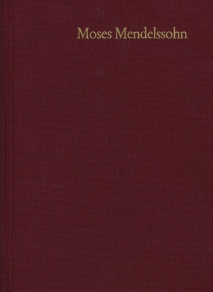Moses Mendelssohn: Band 6,2: Kleinere Schriften II
Links / Downloads
In previously relatively unknown essays, the ›Kleineren Schriften II‹ (Selected Essays II) show Mendelssohn mainly as a grammarien-philosophe. His linguistic theories and studies, the translations (Plato, Shaftesbury, Rousseau among others), his own works and adaptations are all based on Mendelssohn’s belief that a human being capable of thinking can only prove his reasoning skills by means of language. As a critic, Mendelssohn was also aware that German-speaking writers and literary figures around 1750 – unlike the French and the English – lacked philosophical theories of language as well as the joy in the expressiveness of their own language. The innere Gehör (inner hearing), proven by Mendelssohn, is an achievement of the Enlightenment which paved the way for the Sturm und Drang period: from recognizing and mastering the levels of language, speech rhythms, speech melodies to the various meanings of the single spoken word, to mankind’s stummen Beredsamkeit (mute eloquence) and to the Sprachalgebra (linguistic algebra) of abstract knowledge.
All volumes
- Band 1: Schriften zur Philosophie und Ästhetik I – available
- Band 2: Schriften zur Philosophie und Ästhetik II – available
- Band 3,1: Schriften zur Philosophie und Ästhetik III,1 – available
- Band 3,2: Schriften zur Philosophie und Ästhetik III,2 – available
- Band 4: Rezensionsartikel in ›Bibliothek der schönen Wissenschaften und der freyen Künste‹ (1756–1759) – available
- Band 5,1: Rezensionsartikel in ›Briefe, die neueste Literatur betreffend‹ (1759–1765) – available
- Band 5,2: Rezensionsartikel in ›Allgemeine deutsche Bibliothek‹ (1765–1784). Literarische Fragmente – available
- Band 5,3 a-b: Kommentar zu Band 5,1 – available
- Band 5,4: Kommentar zu Band 5,2 – available
- Band 6,1: Kleinere Schriften I – available
- Band 6,2: Kleinere Schriften II – available
- Band 7: Schriften zum Judentum I – available
- Band 8: Schriften zum Judentum II – available
- Band 9,1: Schriften zum Judentum III,1 – available
- Band 9,2: Schriften zum Judentum III,2 – available
- Band 9,3: Schriften zum Judentum III,3 – available
- Band 9,4: Schriften zum Judentum III,4 – available
- Band 10,1: Schriften zum Judentum IV – available
- Band 10,2: Schriften zum Judentum IV – available
- Band 11: Briefwechsel I. 1754–1762 – available
- Band 12,1: Briefwechsel II,1. 1763–1770 – available
- Band 12,2: Briefwechsel II,2. 1771–1780 – available
- Band 13: Briefwechsel III. 1781–1785 – available
- Band 14: Hebräische Schriften I – available
- Band 15,1: Hebräische Schriften II,1 – available
- Band 15,2: Hebräische Schriften II,2 – available
- Band 16: Hebräische Schriften II,3 – available
- Band 17: Hebräische Schriften II,4 – available
- Band 18: Hebräische Schriften II,5 – available
- Band 19: Hebräische Schriften III: Briefwechsel (1761–1785) – available
- Band 20,1: Hebräische Schriften I / Deutsche Übertragung – available
- Band 20,2: Briefwechsel (1761–1785) – available
- Band 21,1-2: Nachträge – available
- Band 22: Dokumente I: Entlegene zeitgenössische Texte zu Mendelssohns Leben und Wirken – available
- Band 23: Dokumente II: Die frühen Mendelssohn-Biographien. Mit Isaak Euchels Mendelssohn-Biographie – available
- Band 24: Moses Mendelssohn. Porträts und Bilddokumente – available
- Band 25,1-2: Register und Corrigenda – available
- Subject Areas
- New Publications
- ---
- Critical Editions
- Abaelardus: Dialogus
- Andreae: Gesammelte Schriften
- Arnauld / Nicole: L'Art de Penser
- Böhme: Die Urschriften
- Böhme: Gesamtausgabe
- Bolzano: Gesamtausgabe
- Droysen: Historik
- Fichte: Gesamtausgabe
- Fischart: Sämtliche Werke
- Franck: Sämtliche Werke
- Frischlin: Sämtliche Werke
- Hülser: Die Fragmente zur Dialektik der Stoiker
- Harnack: Einleitung in das neue Testament
- Hauptmann: Sämtliche Werke
- Hegel: Vorlesungen über Rechtsphilosophie 1818-1831
- Herder: Studien und Entwürfe
- Jacobi: Briefwechsel - Nachlaß - Dokumente
- Locke: Anleitung des menschlichen Verstandes
- Maimon: Gesamtausgabe
- Meier: Beyträge
- Melanchthon: Briefwechsel
- Mendelssohn: Gesammelte Schriften
- Nicolai: Sämtliche Werke – Briefe – Dokumente
- Reinhold: Korrespondenzausgabe
- Reuchlin: Briefwechsel
- Reuchlin: Sämtliche Werke
- Scaliger: Poetices libri septem
- Schelling: Historisch-kritische Ausgabe
- Schelling: Münchener und Berliner Nachlass
- Schickard: Briefwechsel
- Shaftesbury (Anthony Ashley Cooper): Standard Edition
- Steiner: Schriften
- Svarez: Gesammelte Schriften
- Thomas von Aquin: De Unione
- Weigel: Sämtliche Schriften. Neue Edition
- Collected Works
- Series
- Bibliographies and Reference Books
- Allgemeine Zeitschrift für Philosophie
- AZP Beihefte
- Jahrbuch der Psychoanalyse
- JP Beihefte
- Steiner Studies
- Open-Access
- Single volumes
- eBooks
- Special Offers
- ---
- Authors
- Publishing house
- Links / Partner
- Paths to Philosophy
